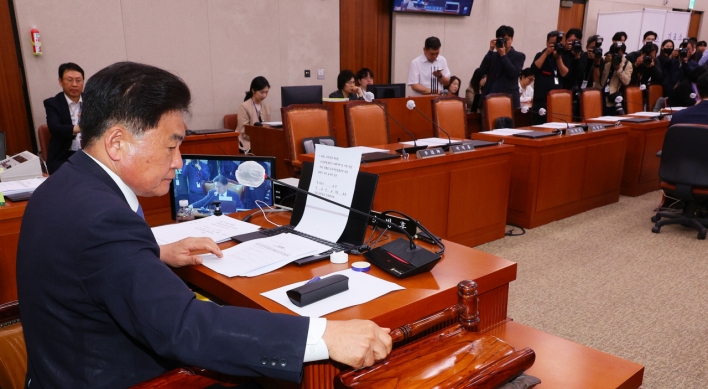Thailand's army chief seized power in a military coup Thursday, deposing its beleaguered civilian government in a bid to end deadly political turmoil but triggering US-led international censure.
The new military junta declared a nationwide night-time curfew and ordered demonstrators on both sides of the kingdom's bitter divide off the streets after nearly seven months of tense political rallies in the capital.
The junta led by army chief General Prayut Chan-O-Cha suspended most of the constitution, banned gatherings of more than five people, and ordered the ousted cabinet and other ruling-party leaders to report to the army on Friday at 10:00 am (0300 GMT).
"All Thais must remain calm and government officials must work as normal," Prayut said in a brief televised addressing announcing the takeover, flanked by four of his top officers.
Moments before the coup, there were dramatic scenes at a military-hosted meeting between the kingdom's political rivals aimed at breaking their deadlock.
Witnesses saw leaders of Thailand's two main political parties and its rival protest movements taken away by the military. Their whereabouts remained unknown early Friday.
'No justification'
The US, EU, France and others expressed deep concern.
Secretary of State John Kerry said there was "no justification" for the coup and that it would have "negative implications" for US relations.
He called for "early elections that reflect the will of the people," while the Pentagon said it was reviewing military cooperation with its Southeast Asian ally.
Thailand has been locked in a nearly decade-long political crisis stretching back to a 2006 military coup that deposed controversial tycoon-turned-politician Thaksin Shinawatra as premier.
Since then, a power bloc represented by Thaksin, his family and allies have battled for power with a Bangkok-based royalist bloc close to the military.
Thailand's frequent coups traditionally have needed the approval of the palace, but it was unclear if that was the case on this occasion.
Some observers see the crisis as a struggle to decide who will run the country when the more than six-decade reign of 86-year-old King Bhumibol Adulyadej eventually ends.
Backers of the royalist elite have engaged in several months of escalating confrontation with the democratically elected government aligned to Thaksin, whose sister Yingluck was dismissed as premier earlier this month in a controversial court ruling.
Yingluck and three more of Thaksin's relatives were among those told by the junta to report to military authorities Friday morning. The reason for the summonses has not been made clear.
Thaksin lives in exile after a corruption conviction, but he and his allies retain strong support in Thailand, particularly the rural north, and have won every general election since 2001.
Experts at the Siam Intelligence Unit, a Bangkok-based think-tank, expect an interim premier to be appointed within days and the junta to control power for up to two years and draw up a "draconian" new constitution.
Some fear more turmoil.
"The coup is not a solution at all to end the crisis. This will become the crisis," said Pavin Chachavalpongpun of the Centre for Southeast Asian Studies at Japan's Kyoto University.
"It shows the military has never learned the lesson from 2006," he said, referring to the cycle of political instability stemming from Thaksin's overthrow.
Protests by the anti-Thaksin movement have rocked Thailand for months.
Related violence has left at least 28 dead and hundreds wounded.
Ousted PM in hiding
Caretaker premier Niwattumrong Boonsongpaisan was among ministers ordered to report to the army. An aide said he was "safe" in an undisclosed location.
But Chalerm Yubamrung, a former premier and Thaksin loyalist dismissed earlier with Yingluck, was detained by the military, his son Doung Yubamrung said.
Thailand's democratic development has now been interrupted by 19 actual or attempted coups since 1932.
Martial law -- declared by Prayut on Tuesday and reaffirmed under the coup -- gives the military draconian powers to restrict freedom of assembly and movement and to detain people.
All television and radio stations including foreign broadcasters were ordered to suspend normal programming and air only an army feed.
The junta also said it would block any social media platforms in the country that carry content provoking violence or criticising coup leaders.
UN Secretary-General Ban Ki-moon was "seriously concerned" by the coup, his spokesman said. He urged a return to "constitutional, civilian, democratic rule."
Prayut gave no indication how long the military would hold power.
Anti-government protesters had been demanding the removal of the government and the Thaksin clan's influence in politics, alleging deep corruption.
It was not immediately clear how the staunchly pro-Thaksin "Red Shirt" movement would respond.
"Red Shirt" leaders have said removal of the government could trigger civil war, but there were no immediate reports of unrest.
The coup -- which sent commuters scurrying to get off congested streets before the curfew -- was greeted with jubilation by opposition protesters but dismay by government supporters.
"Our country has been chaotic and has had no solutions for a long time," said office worker Arnusit Chenruk, 39, calling the coup a "good" thing. (AFP)










![[Kim Seong-kon] Democracy and the future of South Korea](http://res.heraldm.com/phpwas/restmb_idxmake.php?idx=644&simg=/content/image/2024/04/16/20240416050802_0.jpg&u=)







![[Today’s K-pop] Zico drops snippet of collaboration with Jennie](http://res.heraldm.com/phpwas/restmb_idxmake.php?idx=642&simg=/content/image/2024/04/18/20240418050702_0.jpg&u=)